英语词汇学第一讲
- 格式:ppt
- 大小:3.08 MB
- 文档页数:58
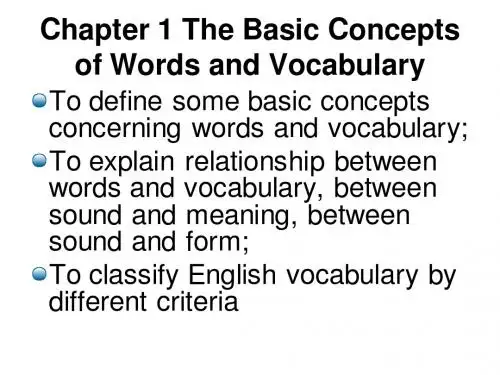
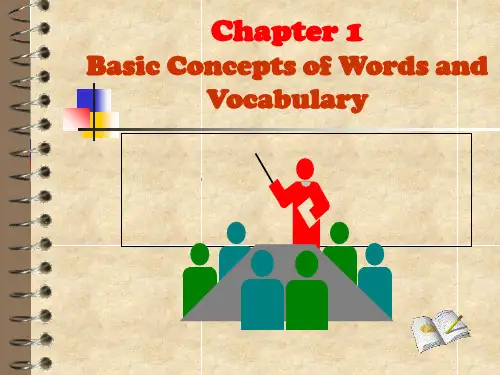
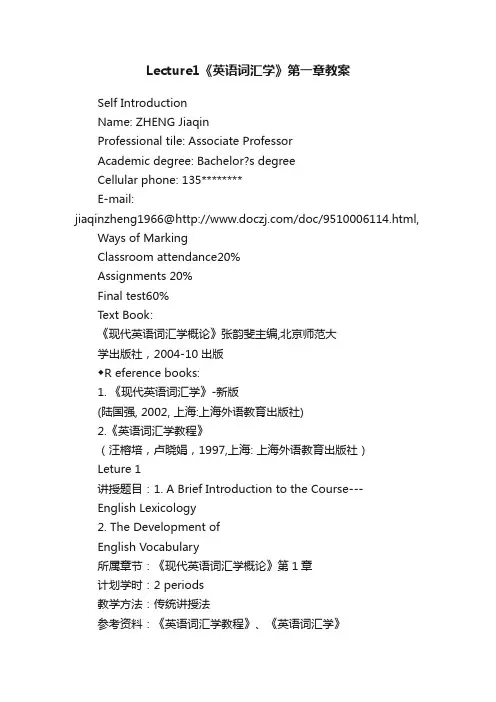
Lecture1《英语词汇学》第一章教案Self IntroductionName: ZHENG JiaqinProfessional tile: Associate ProfessorAcademic degree: Bachelor?s degreeCellular phone: 135********E-mail:jiaqinzheng1966@/doc/9510006114.html, Ways of MarkingClassroom attendance20%Assignments 20%Final test60%Text Book:《现代英语词汇学概论》张韵斐主编,北京师范大学出版社,2004-10出版◆R eference books:1. 《现代英语词汇学》-新版(陆国强, 2002, 上海:上海外语教育出版社)2.《英语词汇学教程》(汪榕培,卢晓娟,1997,上海: 上海外语教育出版社)Leture 1讲授题目:1. A Brief Introduction to the Course---English Lexicology2. The Development ofEnglish Vocabulary所属章节:《现代英语词汇学概论》第1章计划学时:2 periods教学方法:传统讲授法参考资料:《英语词汇学教程》、《英语词汇学》教学目的和要求:通过本单元的学习,学生对英语词汇学的研究对象、性质、特点以及英语语言的发展进程等基本知识有了一定的了解。
IntroductionWhat is linguistics?Generally speaking, linguistics can be defined as the scientificstudy of language. To be more exact, linguistics studies the general principles upon which all human languages areconstructed and operate as systems of human communication.LEXICOLOGY1.The term lexicology contains two Greek morphemes: “lexikon”and “logie”; the former means “word or phrase”, while the latter “learning or the study of”.2. The literal meaning is the “science of the word”.3. It is the study of the signification/meaning and application/uses of words.4. Lexicology is a branch of linguistics inquiring into the origins and meanings of words ( WNWD-Webster?s New World Dictionary of the American Language ).THE FIVE SUB-BRANCHES OF LEXICOLOGY 1.Semantics: the study of the meanings of words and other parts of language.2.Etymology: studies the meanings, origin and history of individual words and their development.3. Historical lexicology: studies from a historical point of viewthe development of vocabulary4. Phraseology(成语学): mainly deals with set expressionsand idioms.5. Lexicography: studies the writing and making ofdictionaries.English lexicologyEnglish lexicology deals with English words, their origin, meaning, morphological structures, semantic structures, sense relations , idioms, historical development, formation and usages.The Nature of English LexicologyEnglish lexicology is a theoretically-oriented course. It is chiefly concerned with the basic theories of words in general and of English words in particular. However, it is a practical course as well, for in the discussion, we shall inevitably deal with copious stocks of words and idioms, and many usages examples. Naturally, there will be a large quantity of practice involved.THE AIMS OF THIS COURSEOffer an insight into the origin and development of the Englishvocabulary.Give a systematic description of the English vocabulary.Discuss the problems of word-structure and word-formation Study the use of English words , their meanings and changes in meaning, their sense relations.THE SIGNIFICANCE OF THE COURSEDevelop your personal vocabulary and consciously increase your wordpower (active vocabulary).Understand word-meaning and organize, classify and store words moreeffectively.Raise your awareness of meaning and usages, use words more accurately and appropriately.Develop your skills and habits of analyzing and generalizinglinguisticphenomena in your learning experiences.Ultimately improve your receptive and productive skills in languageprocessing as well as language production.TWO APPROACHES TO THE STUDY OF ENGLISHLEXICOLOGYA synchronic approach is an approach to the study of a language at one period of time,A diachronic approach is an approach to the study of the change in a language that took place over a period of time.There are two approaches to the study of words, namely synchronic and diachronic. From a synchronic point of view, words can be studied at a point in time, disregarding whatever changes might be taking place. For example the word …wife? now means ……a married woman, esp. in relation to her husband??. This is the current meaning.It has an obsolete meaning …woman?, which is only preserved in midwife, housewife, Bathwife, etc. However if we take a diachronic perspective, we will consider the word historically, looking into its origin and changes in form and meaning. In this light, the word …wife? evolved from the old English … wif ?, meaning … woman?, but later it became specialized in the course of development to the modern meaning …a married woman?.TWO APPROACHES TO THE STUDY OF ENGLISHLEXICOLOGYModern linguistics is mainly synchronic, focusing on the present-day language (English words), but we need the diachronic approach as a supplement, for a knowledge ofhistorical development of the vocabulary will definitely be of great help to us in our language study.Questions and Tasks1. What is lexicology?2. What is the nature and scope of English lexicology?3. Why should a student of English study English lexicology?。
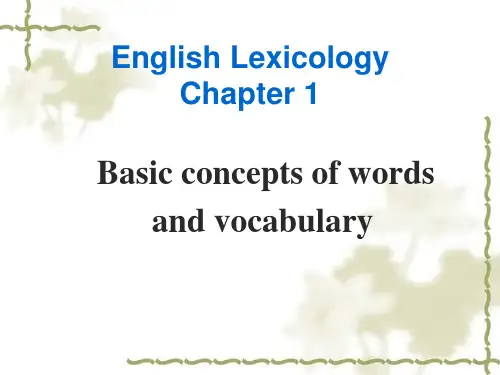
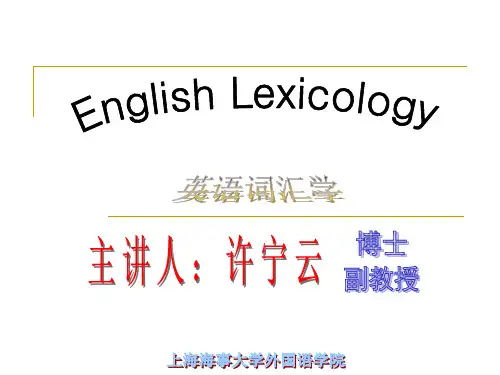
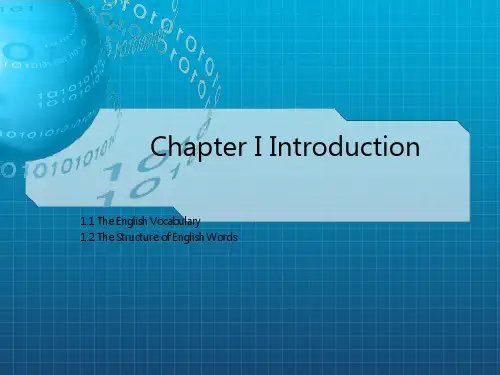
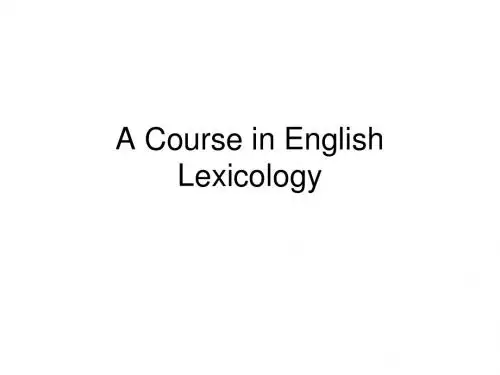
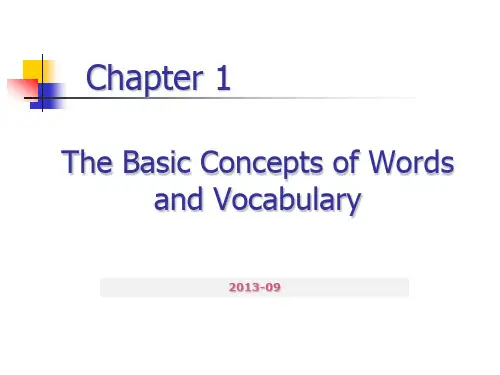

实用英语词汇学1学术意义上的英语词汇学博大精深。
本人拟讲之词汇学定位在实用上,是借用构词法知识,通过文化朔源、近义归纳、来对英文词汇进行组合,使记词2趋向于逻辑记忆与趣味记忆,以达到提高学习效率,扩展词汇的目的。
学习重点3形义相似文化溯源、构词法则。
4学习难点:记词思维的转换5一、构词法记词(一)词根的概念(1)自由根,独立成词able disable unable enable view review preview interview6port import export transportporter portable school scholar scholarship scholasticpair impair repair7clear clarify declare appear apparent transparent(2)粘着根,该类词根必须与其他词缀组合方能成词8vis(看)visit visible vision revise supervisesol(日、太阳)solar insolate son(声音)resonant supersonic unison sonic9lun(月亮)lunar plenilune patr(i)(父亲) patriot expatriatepatroncompatriotmot(动)motion motive10motivationpromoteauto(自,自己)automobile automation automatic11bio(生命)biographybiologybiosphereautobiography tele telecom telescope12telegraphy telegram二、文化组合法对一些单词寻根追源,结合文化背景进行组合13例1:ChristmasChristChristenChristianity14例2:Ever 今义:曾经;古代有永远之意,这一点今天体现在组合词中:evergreen15everlastingforevereverbright例3:Genesis gene genetic 可与圣经故16事创世纪结合例4:man human exhume inhume圣经上讲上帝用泥土造人,human一词中“hum”作为词根有17泥土之意,exhume 从词汇构成上看是ex+hum+e,组合成为基本义是从土中出,引申为挖掘。
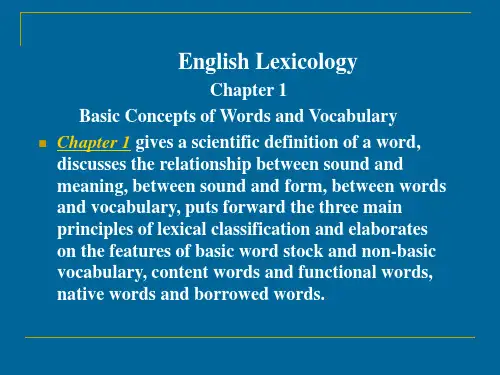

Chapter 1 Basic Concepts of Words and Vocabulary 1. The definition of a word: A word is a minimal free form of language which has a given sound and meaning and syntactic function. 2. Sound and Meaning There is no logical or intrisinc connection between a sound and what it refers to. The relation between sound and meaning is almost always arbitrary or conventional. The same language can use the same sound to mean different things and the different languages use different sounds to refer to the same thing. 3. Sound and Form The written form of English is not an acurate representation of the spoken form.There are different causes of the differences between sounds and forms in the English language. 1)The English alphabet was adopted from the Romans, which does not employ the system of one single letter to stand for one sound. 2)The early scribes deliberately changed spelling of words to make a line even or for easier recogniton. 3) Dictionaries help to fix the spelling of words 4) English has borrowed many words from other languages, which may not have been assimilated . 4. Vocabulary All the words in a language are termed as vocabulary. However, vocabulary can also be used to refer to all the words in a book, or in a particular historical period of time, or in a dialet, or in a particular discipline, or even to all the words that a person possesses. 5. Classification of Words Words can be classified into the basic word stock and nonbasic word stock by use frequence, into content words and functional words by notion and into native words and borrowed words by origin. 1)The Characteristics of the Basic Word Stock (1) All national character (2)stability (3)productivity (4)polysemy (5)collocability 2)The Characteristics of borrowed words (1)Denizens: the early borrowed words which have been assimilated and conformed to the English way of pronounciation and spelling. (2)Aliens: the borrowed words which have retained the foreign way of pronounciation or spelling and have not been assimilated into the English language. (3)Translation-loans: the words and expressions which are formed from the existing English materials, but modelled on the patterns of another language. (4)Semantic loans: Words which have not been borrowed with reference to the form, but to the meanings. 3) Roles Played by the native words. Native words are limited in number, but form the core of the English language. Native words are often neutral in style and frequent in use。